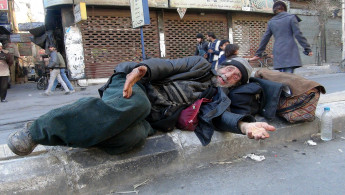Syria's Palestinians: Displaced a second time
Ayad, a young Palestinian, arrived in the Dutch city of Eindhoven after a long and arduous journey on the refugee route - not knowing that he would have the right to apply for Dutch citizenship within three years because he was Palestinian.
Ayad had left his home in the Handarat refugee camp in Syria, north of Aleppo, along with the remaining Palestinian refugees who were originally displaced from Haifa, Acre and Safed. They began their journey in April 2013, after the streets of their refugee camp turned into a battlefield between opposition and regime forces.
Once he arrived in The Netherlands, he discovered a special rule available for Palestinians - as they are considered people without a homeland.
| Palestinians who had waited for more than 60 years in Syria to return to their homes have been displaced for another time |
In Syria, Handarat was not the only Palestinian refugee camp whose residents were forced to flee due to the regime's brutality and destruction. Residents of the Sbainah, al-Hussainiyah and al-Yarmouk refugee camps in the suburbs of Damascus suffered similar fates.
Palestinians who had waited for more than 60 years in Syria to return to their homes have been displaced for another time and have been left searching for new place to seek refuge, and longing again for the refugee camps that have become their temporary homelands.
Destroyed camps
A few days before the end of 2012, Syrian regime forces erected checkpoints at the various entrances to the Yarmouk refugee camp after having shelled a number of opposition-held spots inside the camp, held in coordination with Palestinian factions.
The regime gradually tightened its grip upon the camp and commenced a relentless bombing campaign, forcing many residents to seek refuge in neighbouring areas.
"The regime imposed a complete siege on Yarmouk, and regime checkpoints... blocked the entry of food supplies and fuel from July 2013," said Hassan Abu Khadra, a local activist.
"They also cut off the camp's water supplies in September 2013 and arrested hundreds of young men as they entered and exited the camp," he added.
The Yarmouk refugee camp was home to some 350,000 people before the Syrian uprising began, but by the time the camp fell under the control of the Islamic State group (IS) in March, only 18,000 of its residents had remained, according to Abu Khadra.
| Ali believes the regime is punishing Palestinian refugees because they supported the revolution of the Syrian people. |
Denied entry
Residents of other refugees camps in the suburbs of Damascus were also forced to flee the fighting. But those from Sbainah and al-Hussainiyah have been prevented from returning home by the regime troops who have taken control of the camps.
Residents of these refugee camps launched a campaign in April, in an attempt to get their voices heard and to be allowed to return to their lives in the camps. Their pleas appear to have fallen on deaf ears.
Muhannad al-Hussaini, a Palestinian refugee who took part in the campaign, told al-Araby al-Jadeed they aimed to voice the grievances of 50,000 Palestinian refugees who had become displaced.
"We wanted to protest the unjustified delay by the regime and Popular Front militias in allowing residents of Sbainah and al-Hussainiyah to return," Muhannad told al-Araby al-Jadeed.
In some cases, the regime has populated areas that used be inhabited by Palestinian refugees with the families of foreign militias that are fighting alongside Assad forces, according to Palestinian journalist Adnan Ali.
Ali told al-Araby al-Jadeed the regime had allowed foreign militias to take over empty houses left behind by Palestinian refugees in Sayyida Zainab and Hijairah, south of Damascus, and it plans to do the same in the Sbainah and al-Hussainiyah refugee camps.
Ali believes the regime is punishing Palestinian refugees because they supported the uprising of the Syrian people.
"This is proven by the regime's continuous bombardment of the Yarmouk camp - despite the fact that most of its residents have become displaced and it does not contain any military targets," said Adnan Ali.



